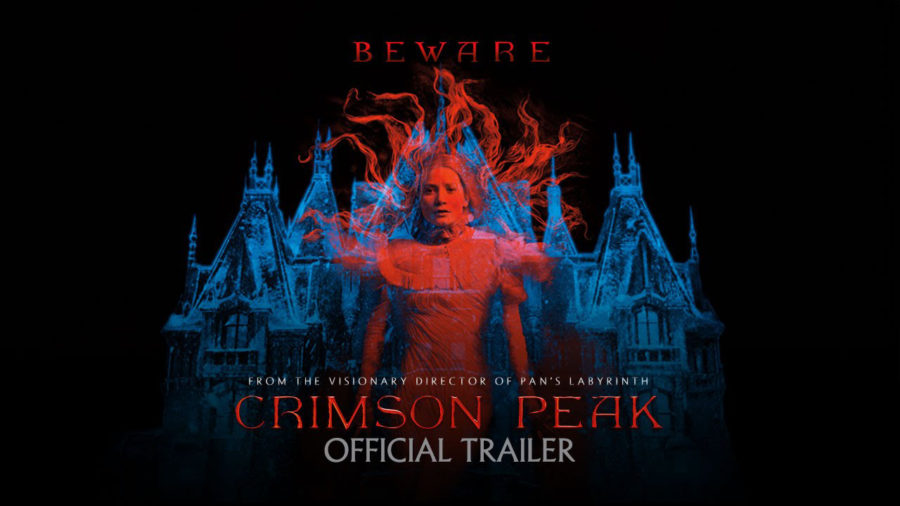Tom, there’s a hole in your roof. Maybe you missed that. Oh, and your entire house is sinking into what appears to be a blood canyon, Tom. Did I mention there are screaming ghosts in the bathroom? Also, your sister lives here. Isn’t that weird since you’re married, Tom?
These are a few of many questions I asked “Crimson Peak” semi- antagonist Tom Hiddleston after cringing my way through an hour of awkward dialogue. It’s difficult to refer to Tom Hiddleston’s character as anything other than Tom Hiddleston, because I can’t seem to separate the actor from his roles. At this point, as I haven’t been able to escape seeing his face every time I browse the Internet, all of his characters are Tom Hiddleston to me.
“Crimson Peak,” directed by Guillermo del Toro and written by del Toro and Matthew Robbins, debuted internationally on Oct. 16. The film was made on a budget of $55 million and stars Mia Wasikowska, Tom Hiddleston, Jim Beaver and others. It currently holds a 70 percent approval rating on Rotten Tomatoes.
The most difficult thing to swallow while watching the film is how increasingly unbelievable the scenarios get. The plot is this: an English man named Tom Hiddleston—excuse me, Sir Thomas Sharpe—comes to America and meets protagonist Edith (Wasikowska). The two fall in love over the course of what feels like a few minutes, shenanigans ensue, they get married and they move back to England in a fit of impulsiveness. Sharpe’s house is a mansion that barely has any ceiling at all. In addition, yes, his sister lives there, too, and the walls ooze with blood- red clay. Apparently that’s what your walls do when you build your house on top of a clay deposit, which seems like something only weirdos would do in the first place.
The clay is the reason the house and the hill on which it’s situated are nicknamed Crimson Peak in the film. The moniker probably has nothing to do with blood or ghosts—of course not. But funnily enough, the film itself has barely anything to do with blood or ghosts, which is opposite of how it was marketed. I was promised blood and ghosts, you Piccadilly dirt bags.
This brings me to the red motif and how I’m supposed to feel like it represents something important and thought-provoking. Sometimes movies attempt to take on the literary value of books. It can work to a degree, if done carefully— Frank Darabont’s “The Shawshank Redemption” comes to mind—but del Toro’s latest work jams its attempts into the audience’s face such that it feels like an insult. Tom, do you mean to tell me that everything colored red in this movie is pretty much evil? Gosh, I had no idea.
The film’s meat and bones are not its only failing points. Wooden performances also stunt the piece, as actors come off as being unable to figure out how to portray characters who exist in the late 19th century. Hints of English accents and awkward speech patterns alone are enough to keep the viewer from full immersion. The only actor who seemed to grasp his role was Jim Beaver, but there is an unfortunate lack of Jim Beaver for a good three- fourths of the film. His absence is a colossal lapse in judgment on the creators’ parts, especially given
Beaver’s track record. However, the script was written circa 2006, so shoehorning his character into the rest of the movie likely would have made things messier.
Writing has never been one of del Toro’s stronger points. That much is obvious to anyone who has seen his 2013 flick “Pacific Rim.” That said, the writing in “Crimson Peak” is perhaps among the film’s worst elements. Characters’ reactions were unbelievable, the scenarios and dialogue were riddled with clichés and it was a chore to attempt to relate to anyone. As I mentioned, the script was finished in 2006, and I can’t help but feel as though it saw no edits or changes since then—a sort of “junior high first draft,” in a manner of speaking.
The movie isn’t awful. It’s fun to stare at while slurping down a Coke, to see it but not necessarily watch it. It’s a passable autumn movie that doesn’t make one’s evening better or worse. Yet there is plenty of praise for the film, and all praise thrown its way is valid. But the fanfare surrounding it and del Toro’s past works is almost hysterical. “Crimson Peak” is being heralded as this year’s godsend film, which makes me wonder if these people have ever seen a good movie.
There’s no substance here, and I mean none at all. Give “Crimson Peak” a pass unless you don’t mind seeing a throwaway period piece that features a ghost here and there.































